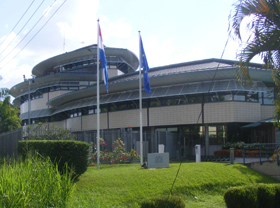Dutch Caribbean broadcasts end

Tweet
By Henk Hendriks, former Surinam correspondent for RNW
Radio Netherlands Worldwide (RNW) is the Dutch equivalent of the BBC World Service.
On 27 September 2012, it ended its Caribbean broadcasts as part of a closure of all broadcasting in Dutch.
The closures marked the end of a 65-year-old tradition of broadcasting in Dutch on a service which was often regarded at home, according to the RNW website, as “a ‘campsite’ radio station for holidaymakers who want to keep abreast of what’s going on at home”.
However, RNW’s website this year summed up the role of its Dutch broadcasts: “Despite its image at home, the Dutch-language service was much more than just programmes for people on holiday.”
RNW had two-thirds of its budget cut by the former Dutch government. Even though the Rutte administration disappeared within two years, the dismantling of parts of RNW was already in progress, with 250 employees sent home in 2012.
Independent voice
Even though many viewed RNW’s Dutch broadcasts as information for the Dutch abroad, it became a voice of independent journalism in parts of the Dutch Caribbean.
“Every morning I rise with Radio Netherlands,” said an old listener in Surinam during the last Caribbean broadcast on 27 September.
RNW’s Dutch broadcasts to the Caribbean were heard in Surinam and the islands in the Caribbean known as the Dutch Antilles.
Formerly known as the Netherlands Antilles, the former Dutch colonies of Aruba, Bonaire, Curacao, Saba, St Maarten and St Eustacius now have different types of nation status since the break-up of the grouping.
Radio Netherlands was founded in 1947 as a restart of broadcasts to the Dutch Indies, when Indonesian nationalists fought for their independence against the Dutch military.
In the Western hemisphere, Surinam and the six islands of the Dutch Antilles were served.
The intention had been to inform the Dutch abroad, to strengthen the Dutch image and to provide independent information in areas where freedom of speech was under threat.
It was also the beginning of the language departments: Dutch, English, Spanish, French and Portugese, along with the regional departments – Indonesian and Latin American – and last but not least, the Caribbean Department.
Complicated relationship
The relationship between the Netherlands and its ex-colonies has always been complicated.
After the turbulent and bloody goodbye to the Dutch (East) Indies, Surinam and the Dutch Antilles became autonomous countries within the Kingdom of the Netherlands.
Foreign affairs, army and jurisdiction remained Kingdom matters.
Yet this set-up did nothing to resolve the local ambivalence towards the former coloniser: the mood was one of suspicion versus acceptance.
In Surinam, these double feelings grew even stronger after independence in 1975.
Thousands ran away and chose a new life in the Netherlands.
And after the military coup in 1980 and the bloodshed in December 1982, the division became even more explicit.
For the enemies of the military, RNW was the sound of the relative safety of the Netherlands.
Meanwhile, the supporters of the “revolution” considered the broadcasts as a confirmation of suppression, colonialism and the sowing of dissent.
Still, Radio Netherlands was one of the most important news sources during that period, though the short-wave broadcasts were continuously blocked by the military.
Whether RNW told the truth or just part of the truth was less relevant. The fact was that things were said on the radio, things that the people in Surinam only could whisper about.
Audience access
Technological developments made it possible for Radio Netherlands to enter families’ homes in Surinam and the Antilles more easily and more frequently.
In the years after 1990, local radio stations all over the world carried complete broadcastings via satellite.
That development created chances to reach a new and younger audience.
Unfortunately, that battle was lost. The younger generation in Surinam and the Dutch Antilles didn’t grow up with Radio Netherlands, as the older generation had.
That’s why Surinam youth did not understand the Dutch preoccupation with former military leader, convicted drugs dealer and present Surinam President Desi Bouterse.
They considered RNW as a nag when it came to human rights and prosecution.
Nevertheless, the fragile ties between the Netherlands and its former colonies made the Caribbean broadcast of RNW an exciting experience, especially for all those journalists and correspondents, who enjoyed an enormous freedom to choose and interpret their subject matter.
So, along with the closure of Radio Netherlands, a substantial part of the ongoing dialogue between the coloniser and the colonised might also have come to an end.
